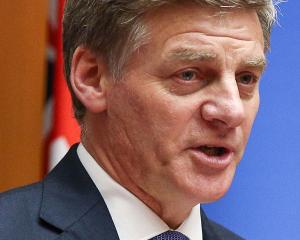As the countdown to September's general election becomes ever more frenetic, one thing is becoming increasingly obvious: those parties which stick to their knitting and produce fresh, even visionary ideas and viable policies stand to be the big winners.
Voters are not of such a negative mood as to tolerate endless whining, complaining, cheap hits on opponents and petty point-scoring generally.
National worked this out long ago. The Greens have since worked it out and are now refocusing on fundamentals.
Labour has had the most difficulty in shedding opposition for the sake of opposition, but is coming to the same realisation, with David Cunliffe now thrusting himself forward as the Apostle of Economic Intervention.
The exception to this requirement to accentuate the positive is New Zealand First whose function in domestic politics is to stress the negative and thus offer refuge to the angry and the alienated. But even a politician of Winston Peters' calibre is finding the going tough.
This week's Herald-DigiPoll survey confirmed there is precious little breadth or depth of anger with National for Opposition parties to exploit.
They keep trying, in part because that is one of the functions of Opposition and in part because they want to believe that the next semi-crisis or mini-scandal to afflict National will be the one which sets National's and John Key's opinion poll ratings on an irrevocable slide.
If anything, the opposite is happening.
Mr Key is enjoying something of a second honeymoon with voters. In part, that is down to his unashamed pragmatism.
He may have lost voters' trust on peripheral issues such as the GCSB. On the matters that actually impinge on people's daily lives, however, he has ensured he is swimming in the stuff.
Mr Key's and National's stunning poll ratings are also down to something else - the clear signs that the economy is now growing at a reasonable pace at last. When it comes to the things which really matter to voters, National has made sure it has got the basics in order.
That is why there is palpable frustration in the Beehive that National's projection of an image of competence keeps being blurred by unwanted static, the latest examples being the maelstroms surrounding the actions of Judith Collins and Hekia Parata, who this week made an absolute botch of her handling of allegations of misspending by a subsidiary of Te Kohanga Reo National Trust.
But voters do not seem to care about these blots on National's landscape. And come September, nobody will be talking about whom Ms Collins had dinner with in Beijing. Or how Ms Parata could go to bed saying one thing and get up the following morning mouthing the exact opposite.
In Ms Collins' case, Labour's Grant Robertson has done a splendid job in not only vanquishing one of National's most formidable performers but also citing her an an example of what Labour refers to as National's ''crony capitalism'', by which National allegedly uses the instruments of the state - be it the tax system, bureaucracy or whatever - for the benefit of its ''rich mates''.
The ''crony capitalist'' labelling, designed to drive a wedge between National and middle income and upper middle income voters who possess a conscience, has so far been a flop.
The same has been the case with Mr Cunliffe's similar exercise in wedge politics. He has also sought to siphon off the same segments from National by likewise appealing to their social conscience by talking about little else than income inequality and child poverty in his speeches, while carefully stressing those voters, comfortably off as they are, will not be socked with the tax rises needed to provide relief for the poor.
It is on income disparity, the cost of living and wages growth (or rather the lack of it) that National is vulnerable and where Labour, until now, has sought to fight the crucial debate on who is best to run the economy.
But it has been a holding operation for Labour. National is delivering growth which - it will argue - will begin to remedy the very things Labour has been highlighting.
Mr Cunliffe has known all along he would have to confront National's strengths when it comes to economic management. He relishes the opportunity.
This week he began the battle with promises of accelerated depreciation and suspensory loans for the forestry industry. That may not have grabbed the headlines, but, if you are promising a revolution in how the economy is run, then the revolution has to start somewhere.
Mr Cunliffe not only articulated his vision of a ''value-added ''economy - something he has done many times before - he also detailed for the first time exactly how that vision would be applied in a particular sector of the economy.
To watch Mr Cunliffe extol the virtues of what he calls ''intelligent hands-on'' economic management is to witness the Labour leader at his most confident and self-assured best.
One of the reasons why he has won the hard-earned respect of those on Labour's left is that Mr Cunliffe has been utterly consistent throughout his nearly 15 years in Parliament in his favouring a far more interventionist approach. It is also an approach which would go much further than Labour's ''soft'' intervention of the Clark-Cullen years.
A politician arguing the need to add value to raw product rather than simply increasing the volume of that product is hardly new. Just recall Mike Moore's promotion of his lamb burger.
National is thus dismissing Mr Cunliffe's approach as a return to the failed policies of the 1970s. What is different in Mr Cunliffe's case is that he has had the time and the intellect to produce an integrated, cohesive and comprehensive blueprint for a more planned economy.
In what seemed to be a clever piece of political choreography, the day after Mr Cunliffe's forestry announcement, Rotorua's Red Stag Timber company announced it would invest $120 million in upgrading its plant on the basis of Labour's policy.
The irony was that like Mr Key's trip to China, Mr Cunliffe's forest policy package was pushed into shadows partially as a result of Labour rounding on Ms Collins and Ms Parata.
Annoying as that might be to Mr Key, he can afford it to happen.
Mr Cunliffe cannot. Labour has to get its priorities right.
- John Armstrong is The New Zealand Herald political correspondent.




